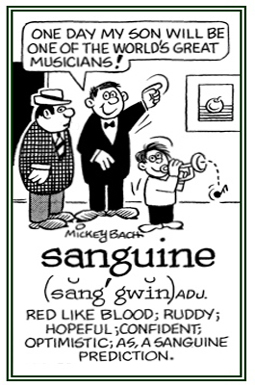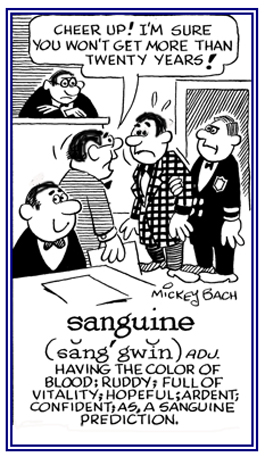Although many dictionaries indicate that sanguine means "bloody", since it is derived from a Latin origin meaning "bloody" or "full of blood", it is now rare that anyone uses it in that sense any more.
2. Of or pertaining to the red fluid that flows in the body: Sharon was told that her sanguine complexion meant that she had a healthy supply of blood flowing through her veins.For more historical background information about sanguine, see the article at the bottom of this page.


Go to this Word A Day Revisited Index
so you can see more of Mickey Bach's cartoons.
The similarity in form between sanguine, "cheerfully optimistic", and sanguinary, "bloodthirsty", may prompt people to wonder how these words have resulted in such different meanings.
The explanation lies in medieval physiology with its notion of the four humors or bodily fluids (blood, bile, phlegm, and black bile). The relative proportions of these fluids was thought to determine a person's temperament.
If blood was the predominant humor, then that person had "a ruddy face and a disposition marked by courage, hope, and a readiness to fall in love".
Such a temperament was called sanguine, the Middle English ancestor of the modern word sanguine. The source of the Middle English word was Old French sanguin, itself from Latin sanguineus.
Both the Old French and Latin words meant "bloody, blood-colored". Latin sanguineus was in turn derived from sanguis, "blood", just as the English "sanguinary" is.
The English adjective sanguine, was first recorded in Middle English before 1350, and it continues to refer to the "cheerfulness" and "optimism" that accompanied a sanguine temperament but it no longer has any direct reference to medieval physiology.
2. Description of a person's ruddy skin tone: After a day hiking in the mountains, Jon had a fresh and sanguine complexion.
2. Concerning the color of person's vital fluid; cardinal-red: Tommy's new sanguineous shoes were hard to keep clean.
Gail's sanguine personality was matched by her sanguineous cheeks which were a rosy red; however, her favorite reading materials have been murder novels and the more sanguinary they are, the more she likes to read them!
